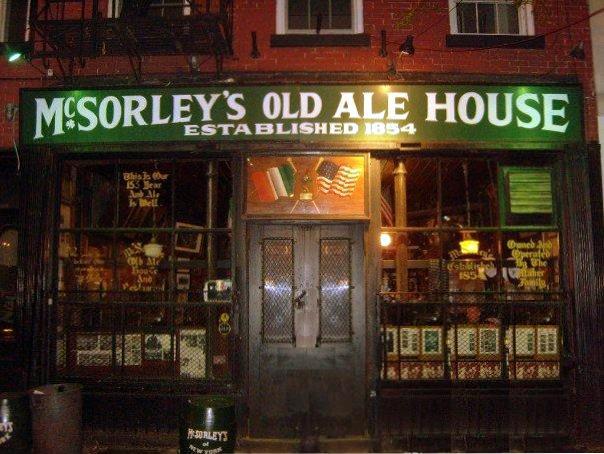McSorley’s Celebrates 170 Years as a Gotham Institution
It’s the place to go this weekend for those thirsty for a taste of the past.

New York City’s “oldest continuously operated saloon,” McSorley’s Old Ale House, celebrates 170 years at 15 East 7th Street this weekend. It’s a chance to experience a place where the clock stands still — usually until the government decides to wind it.
“If there is anybody in New York who is not familiar with this delightfully quaint place,” a man wrote the Sun in 1916, “he does not know his New York. … I wish I could introduce all the Sun’s readers” to the “serious thinkers” there. “I don’t know of a more interesting town tavern.”
“McSorley’s is transcendent,” the current owners, Gregory and Teresa de la Haba, tell the Sun via email. “The place connects with people on a metaphysical level, truly.” Patrons “who enter through those ancient swinging doors not only feel an immediate connection with the past, but a spiritual connection to” it.
“The walls do speak to them,” the de la Habas said, “and they love listening.” So, shedding modern comforts like Wi-Fi, patrons will soon pack McSorley’s sawdust-covered floorboards to enjoy live music and birthday cake provided by Veniero’s bakery, founded in 1894.

McSorley’s smells like leather and the tobacco — banned in 2013 — smoked in various forms, including from complimentary ceramic pipes, for generations. A coal-fired, potbelly stove of the sort that once toasted straphangers in Elevated train stations warms away the winter chill.
To enter McSorley’s is to walk in the footsteps of everyone from presidents to Woody Guthrie, General MacArthur, John Lennon, and Frank McCourt. The parade endured through wars, depressions, and Prohibition, serving light or dark ale only. No spirits.
The de la Haba’s described “a bar that hasn’t changed much since 1854,” with “the same icebox, same urinals — since 1910, anyway, because that’s the year the city put sewage pipes in the East Village — and even the old, 1834 print” of Downtown hung by founder, John McSorley.
Thanks to the three families who have safeguarded its legacy, McSorley’s boasts, “We Were Here Before You Were Born.” The chair where President Lincoln sat — after the speech at Cooper Union that launched his campaign — has a place of honor. So do Harry Houdini’s handcuffs, latched to the bar rail.
Rafe Bartholomew, author of “Two and Two: McSorley’s, My Dad, and Me,” said in our History Author Show interview, “No matter what happens to the rest of New York, the core of McSorley’s only gets stronger and more special the more the rest of the city transforms around it.”
McSorley’s slogan was once, “Good Ale, Raw Onions, and No Ladies,” but it was blown down like the original sign — lost in a 1908 storm — by regulations and a 1970 court ruling, although women didn’t get their own restroom until 1986.
If the McSorleys could see the saloon today, the de la Habas said, “They’d love it, especially knowing that we kept all the pictures just as John put them and as Bill nailed them to the walls after his father’s passing.” They’d find the liverwurst, spicy mustard, and Liederkranz cheese plates familiar, too.
However, “Ol’ John,” the de la Habas said, “might have a heart attack knowing that Teresa is not only the first female bartender in the saloon’s long and storied history but is also the boss.” Her father, the legendary Matthew Maher, passed away in 2020, aged 80.
Maher, according to the de la Habas, “always said to ‘keep the doors open, pour them a good mug of ale, and they’ll keep coming back,’ and that’s precisely what we do,” maintaining “the same love and pride,” which people “appreciate.”
In 2011, when a health inspector ordered that McSorley’s dust its iconic wishbones — hung on a gasolier light over the bar by World War I doughboys heading “over there” — Maher handled the grim job himself. Cats, a fixture since “Old Bill,” also ran afoul of City Hall that year.
Regardless of forced concessions to modernity, McSorley’s, the de la Habas said, remains “all about family.” As that Sun reader wrote, the uninitiated “ought to make tracks in that direction,” either for this weekend’s celebrations or any future day when they’re thirsty for a taste of the past.

